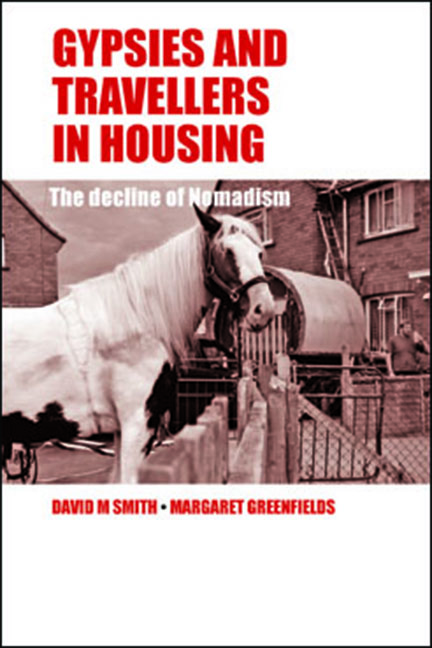Book contents
- Frontmatter
- Contents
- List of tables
- Acknowledgements
- Foreword
- one Introduction
- two Space, surveillance and modernity
- three Gypsies, nomads and urbanisation: a social history
- four The research sites and population sample
- five Routes into housing
- six Housing transitions
- seven Gypsies, Travellers and gorjers: conflict and cooperation
- eight Recreating community
- nine Young people in housing: aspirations, social relations and identity
- ten Conclusion
- Appendix A Methodologies
- Appendix B Glossary of words and terms
- References
- Index
seven - Gypsies, Travellers and gorjers: conflict and cooperation
Published online by Cambridge University Press: 03 February 2022
- Frontmatter
- Contents
- List of tables
- Acknowledgements
- Foreword
- one Introduction
- two Space, surveillance and modernity
- three Gypsies, nomads and urbanisation: a social history
- four The research sites and population sample
- five Routes into housing
- six Housing transitions
- seven Gypsies, Travellers and gorjers: conflict and cooperation
- eight Recreating community
- nine Young people in housing: aspirations, social relations and identity
- ten Conclusion
- Appendix A Methodologies
- Appendix B Glossary of words and terms
- References
- Index
Summary
We have identified how settlement into conventional housing can entail significant psycho-social and practical challenges for former caravan dwellers. In our subsequent exploration of the various difficulties in adjusting to housing experienced by respondents we will focus on how living in proximity to close kin and being able to access networks of social relationships act as a protective factor in preserving wellbeing (Dawkins, 2006; Fletcher, 2009). The community-based nature of Gypsy/Traveller culture centred around principles of ‘bounded solidarity’ – in-group oriented and with a strong sense of collective solidarity engendered by external threats to the group – has been observed amongst these communities in various historical and geographical contexts (Okely, 1983; Gmelch, 1986; Sanders, 2002). This and the following chapter investigate the structure and nature of these social relations in the study areas and delineate the patterns of interactions that simultaneously generate social closure and boundary maintenance along cultural and ethnic lines and characterise inter-group relations with co-resident neighbours from outside of the travelling community. As explored in previous chapters, inter-group relations and a merging of boundaries between Gypsy/Travellers and largely low-income groups is not a new phenomenon though we posit that in recent decades the pattern of such engagements may be changing in the light of increased diversity within low income areas of dense public housing (Rutter and Latorre, 2009). This chapter thus examines how neighbourhood-level factors influence the cohesiveness of social relations that exist between housed Gypsies (see further Chapter Eight), the nature of inter-group contacts and the extent to which social ties transcend their own boundaries to include their ‘gorjer’ neighbours.
While structural and societal level factors have most commonly been invoked to explain the persistently marginal status of Gypsies and Travellers this status manifests itself, and is contested, in everyday social interactions. For Bottero and Irwin (2003) issues of identity and difference are located within grounded accounts of social practice that consider the relational aspects as ‘elements and outcomes of social changes’. Social relations, they point out, are variable across different historical and cultural contexts, and ‘a focus on their particular articulation helps to shed light on the shaping and reshaping of social experiences and inequalities’ (p 464).
- Type
- Chapter
- Information
- Gypsies and Travellers in HousingThe Decline of Nomadism, pp. 133 - 154Publisher: Bristol University PressPrint publication year: 2013



